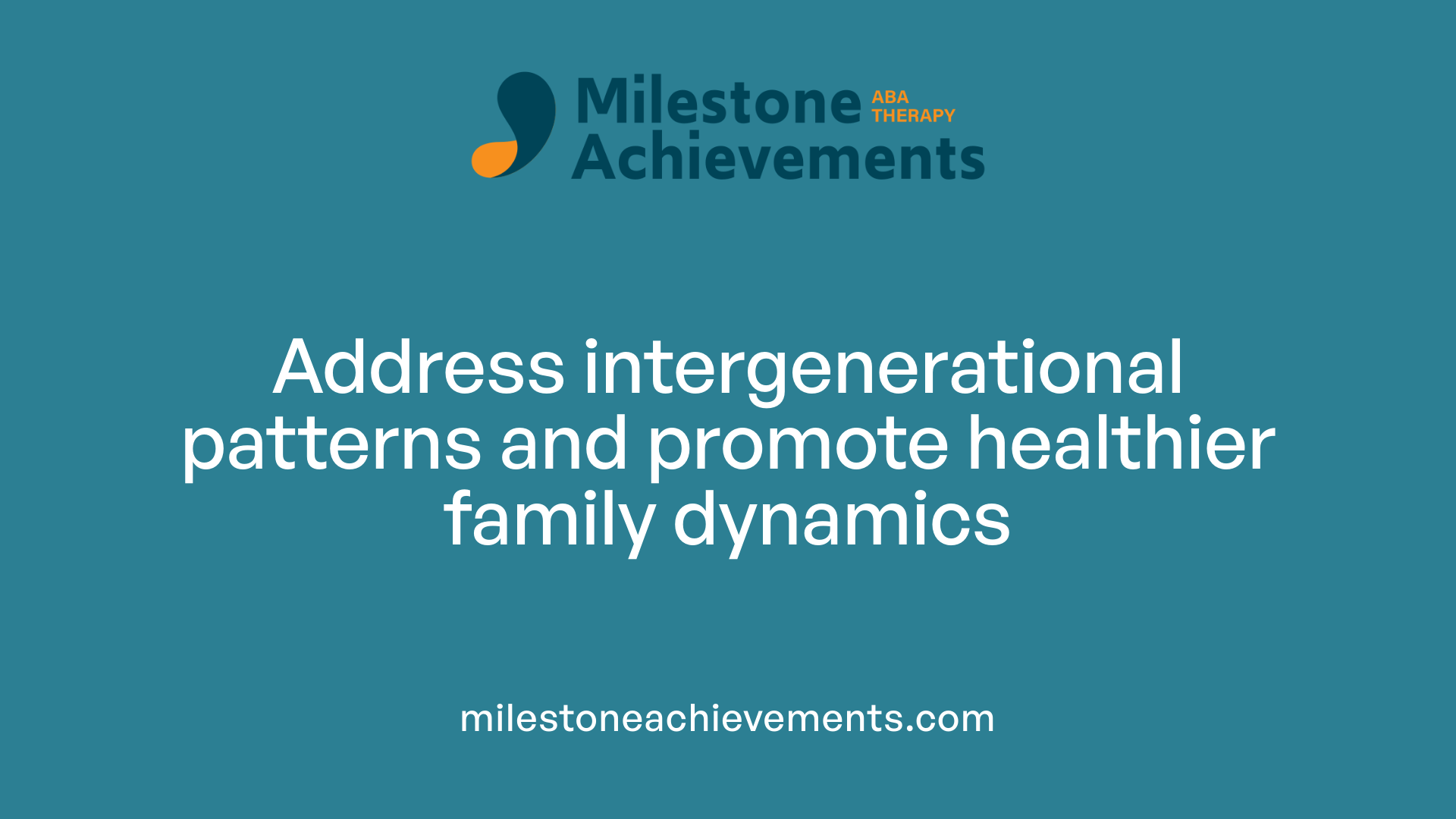
How Parent Involvement Improves Long-Term Therapy Success
Unlocking the Power of Family in Therapy Success
The Crucial Role of Parents in Long-Term Therapeutic Outcomes
Parent involvement is widely recognized as a vital element in ensuring the success of long-term therapy for children and families. When parents actively participate, they not only reinforce therapeutic strategies at home but also foster a nurturing environment that supports ongoing growth and resilience. This article explores how parental engagement and family participation contribute to sustainable therapy outcomes, highlights effective strategies for involvement, and underscores the benefits of a collaborative approach to treatment.
The Importance of Parental Engagement in Therapy Success

Why is parent involvement important in child therapy?
Parent involvement plays a crucial role in a child's therapy journey. It helps reinforce what is learned during sessions and encourages children to apply new skills in everyday settings. When parents actively participate—by attending therapy sessions when invited, maintaining open lines of communication, and modeling positive behaviors—they build a strong foundation for sustained progress.
Creating a supportive environment at home is vital. This can be achieved through establishing routines, encouraging children to express their feelings, and providing emotional security. Tailoring parental involvement to suit the child's age and developmental stage ensures that the support is relevant and effective.
Research shows that when parents are engaged, children tend to respond better and make more consistent progress. Their participation not only reinforces therapeutic strategies but also boosts the child’s confidence and independence. Overall, active parental involvement fosters a sense of stability and understanding, which are essential for meaningful mental health improvement and growth.
Long-Term Benefits of Family Engagement in Therapy

What are the benefits of family engagement in therapeutic processes?
Family involvement in therapy creates a foundation for lasting positive change within the family unit. When parents and other family members actively participate in treatment, they help reinforce learned skills at home, ensuring that progress extends beyond the therapy sessions.
One of the most significant advantages is the improvement in communication. Engaged families tend to communicate more openly and effectively, which fosters stronger emotional bonds. This improved support system helps children feel understood and secure, making them more receptive to therapy.
Family participation also plays a crucial role in addressing underlying issues like generational patterns and behaviors. By recognizing and working through these patterns collectively, families can break cycles of negative interactions and promote healthier relationships.
Creating a supportive environment through family involvement encourages resilience and emotional connection. Such environments motivate children to develop confidence and independence and promote ongoing mental well-being.
Strategies like open communication, family meetings, and shared goal-setting are essential to keep families engaged. Overcoming barriers such as stigma or logistical challenges involves education and flexible solutions like teletherapy.
Regular collaboration between therapists and families enhances treatment adherence and allows for tailored interventions. This consistent engagement supports long-term recovery, resilience, and healthier dynamics within the family.
| Benefit | Outcome | Additional Notes |
|---|---|---|
| Improved communication | Stronger family bonds | Encourages honesty and openness |
| Building resilience | Better handling of stress and setbacks | Family support sustains progress |
| Addressing generational patterns | Healthier interactions and relationship cycles | Breaks repeating negative behaviors |
| Supportive environment | Increased motivation and emotional stability | Fosters a safe space for growth |
Ultimately, family engagement in therapy deepens understanding, enhances treatment outcomes, and creates a resilient support system. This can lead to sustainable mental health improvements and a stronger, more connected family.
Strategies to Maximize Parental Involvement and Effectiveness

What strategies can enhance parent involvement in therapy programs?
Enhancing parent participation in therapy involves multiple approaches that foster a collaborative and supportive environment. One of the most effective tactics is providing comprehensive parent training. This training focuses on equipping parents with practical behavioral management techniques, such as reinforcement strategies and environmental modifications, which boost their confidence and ability to support their child's progress at home.
Establishing clear expectations and specific goals early in the process is crucial. When parents understand their role and the targeted outcomes, they become more engaged and motivated to participate actively. Additionally, involving parents in curriculum planning and setting shared goals encourages a sense of ownership and accountability.
Maintaining open, consistent communication between therapists and parents is fundamental. Regular updates, feedback sessions, and discussions help align efforts, address concerns promptly, and adapt strategies as needed.
Celebrating milestones and acknowledging progress can significantly motivate parents. Recognizing small achievements reinforces their commitment, builds confidence, and fosters a positive outlook on therapy.
Supporting parents emotionally by addressing caregiver stress and emotional needs is essential. Providing resources or guidance for stress management and emotional support can enhance their capacity to participate constructively.
Lastly, encouraging the reinforcement of skills learned in therapy at home—such as practicing communication, social skills, and independence—ensures skills are generalized across environments. Consistent parental involvement creates a stable foundation for long-term success, improving overall therapy outcomes and fostering sustainable growth.
The Role of Therapists in Facilitating Parent and Family Engagement
How should therapists communicate with parents and families?
Effective communication is central to successful family therapy. Therapists should engage with families in an open, honest, and respectful manner, creating a collaborative atmosphere. This involves actively listening to parents’ concerns and providing clear, empathetic feedback.
Educating parents about the importance of their involvement fosters understanding and motivation. Therapists emphasize how daily reactions and support at home influence the child's progress, encouraging parents to participate actively in strategies.
Structured sessions often include dedicated time for parent engagement, where expectations are set, and progress is reviewed. Therapists use techniques like active listening, emotional validation, and 'I' statements to improve communication, helping families feel heard and understood.
Throughout therapy, maintaining confidentiality and respecting each child's privacy are essential. Building a supportive environment reinforces trust, enabling families to work together effectively toward the child’s development.
Can parents sit in on therapy sessions?
Yes, parental presence during therapy sessions is often beneficial and encouraged. When appropriate, initial joint sessions with both parents and the child help establish goals and foster a sense of teamwork.
Having parents involved can make children feel more comfortable and support consistent skill reinforcement at home. For younger children, parent attendance can enhance progress and communication. For adolescents, therapists typically balance involvement by respecting their privacy, sometimes opting for collateral meetings or periodic updates.
Decisions about parental participation depend on the child's age and comfort level, with the therapist guiding the process to prioritize the child's well-being. Overall, including parents in sessions can strengthen family bonds and promote sustained improvement.
Supporting Parents for Long-Term Successful Outcomes
How do parents play a role in successful treatment outcomes?
Parents are integral to the success of their child's therapy. Their active involvement not only reinforces what is learned during sessions but also creates a stable and nurturing environment at home.
Engaging parents in therapy ensures they understand their child's triggers, behaviors, and progress. This knowledge helps parents respond appropriately and consistently, which boosts the child's trust and motivation.
By participating in family therapy and parent-focused training, parents develop skills such as active listening, conflict resolution, and emotional regulation. These skills are directly applicable to daily life, enhancing family interactions and reducing stress.
Involving parents in therapy encourages a collaborative approach, where strategies are tailored to the family's unique dynamics. This partnership improves communication, promotes understanding, and builds stronger relationships.
Research shows that parental involvement increases adherence to treatment plans, supports the generalization of skills across different settings, and leads to more sustainable improvements. Parents who are confident in applying therapeutic techniques tend to see better long-term outcomes for their children.
Providing parent training and coaching
Training parents on therapeutic techniques, such as behavior management and reinforcement strategies, empowers them to reinforce skills outside of therapy. Ongoing coaching helps address challenges and adapt strategies as needed.
Building confidence and reducing stress
Parent training also enhances confidence, reducing stress associated with managing behavioral or developmental challenges. When parents feel equipped and supported, their involvement becomes more consistent and effective.
Creating supportive networks and resources
Accessible resources, community support groups, and professional networks provide parents with additional encouragement and information. These networks foster resilience, reduce feelings of isolation, and promote knowledge sharing.
Monitoring progress and adapting strategies
Regular communication between parents and therapists allows for tracking progress and fine-tuning intervention strategies. This adaptive approach ensures that therapy remains relevant and effective over time.
| Strategies to Promote Parent Involvement | Description | Benefits |
|---|---|---|
| Parent training sessions | Teach effective techniques and behaviors | Increased confidence, skill reinforcement |
| Weekly goal setting | Establish clear, achievable goals | Increased motivation, accountability |
| Family meetings | Discuss progress, challenges, and strategies | Improved communication, shared understanding |
| Use of teletherapy | Overcome logistical barriers | Enhanced accessibility, flexibility |
| Celebrating milestones | Recognize achievements | Boosts motivation, positive reinforcement |
Long-term advantages
Supportive parental involvement fosters resilience, improves communication within the family, and creates a foundation for ongoing emotional and social development. When parents are engaged through training, coaching, and consistent communication, children are more likely to generalize skills across various environments, leading to lasting success.
Radical Minds understands the importance of parent involvement and offers comprehensive training, coaching, and flexible support tailored to each family’s needs. This approach aims to empower parents, ensuring they have the tools and confidence to support their child's growth long-term.
Empowering Families for Lasting Change
Ultimately, the success of long-term therapy hinges on active and engaged parental involvement. When parents are equipped with the right skills, knowledge, and support, they can reinforce therapeutic gains, address underlying issues, and foster an environment of growth and resilience. Family engagement creates a foundation of trust and understanding that benefits not only the child's immediate progress but also their future well-being. Organizations like Radical Minds provide essential resources—such as parent training, coaching, and ongoing collaboration—that empower parents to become effective partners in their child's mental health journey. Recognizing the importance of family in therapy underscores the need for a holistic, collaborative approach that emphasizes communication, education, and support, ensuring enduring success.
References
- Optimizing Family Therapy Through Parent Involvement
- The Role of Parent Involvement in ABA Therapy - Radical Minds
- How to Encourage Parental Involvement and Boost the Success of ...
- Why Family Participation is Vital in Therapy Sessions
- Therapist Focus on Parent Involvement in Community-Based Youth ...
- How to Encourage Parental Involvement and Boost the Success of ...
- The Role of Parent Involvement in ABA Therapy - Radical Minds
- Unleashing the Power of Parent Involvement in ABA Therapy
- The Power of Parental Involvement in Education and Child Well-being
- Olive Crest | Strong Families, Safe Kids


Partner with us on your child's journey
Milestone Achievements offers evidence-based ABA therapy to help children with autism reach their full potential. Together we’ll set meaningful goals and celebrate progress every step of the way.
Start ABA Services Today


